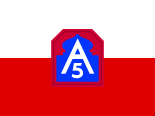American Fifth Army
| Fifth Army Fifth United States Army United States Army North |
|
|---|---|

United States Army North shoulder sleeve insignia
|
|
| Active | 4 January 1943 – 2 October 1945 11 June 1946 – present |
| Country |
|
| Branch |
|
| Type | Army Service Component Command |
| Size | Field army |
| Part of |
Allied Armies in Italy (later renamed Allied forces in Italy and then 15th Army Group) United States Northern Command |
| Garrison/HQ | Fort Sam Houston, Texas |
| Motto(s) | "Strength of the Nation!" |
| Engagements | World War II |
| Commanders | |
| Current commander |
Lieutenant General Jeffrey S. Buchanan |
| Notable commanders |
Mark W. Clark Lucian Truscott John P. Lucas William B. Caldwell III Guy C. Swan III Thomas R. Turner II William B. Caldwell IV |
| Insignia | |
| Distinctive unit insignia |  |
| Flag |  |
The United States Army North is a formation of the United States Army Service Component Command of United States Northern Command. As the joint force land component command, it is responsible for homeland defense and defense support of civil authorities. It is garrisoned at Fort Sam Houston, Texas. From early January 1943, when it was first created during World War II, under the command of Lieutenant General Mark Wayne Clark, until 2004, it was previously designated as the United States Fifth Army.
The United States Fifth Army was one of the principal formations of the U.S. Army in the Mediterranean during World War II, and was the first American field army ever to be activated outside of the United States. It was officially activated on 5 January 1943 at Oujda, French Morocco and made responsible for the defence of Algeria and Morocco. It was also given the responsibility for planning the American part of the invasion of mainland Italy, and therefore was not involved in the Allied invasion of Sicily (codenamed Operation Husky), where it was instead assigned the role of training combat troops destined for Sicily. The United States Fifth Army was initially commanded by Lieutenant General Mark Wayne Clark, who would lead the Fifth Army for nearly two years, and was to experience some of the toughest fighting of World War II, where it was engaged on the Italian Front, which was, in many ways, often more reminiscent of the trench warfare of the Western Front in World War I. Writing to Lieutenant General Jacob L. Devers (American deputy to Field Marshal Sir Henry Maitland Wilson, Mediterranean Theater commander) in late March 1944, Clark explained the difficulties of the fighting in Italy so far, which could be said of the whole campaign. They were, he claimed, "Terrain, weather, carefully prepared defensive positions in the mountains, determined and well-trained enemy troops, grossly inadequate means at our disposal while on the offensive, with approximately equal forces to the defender."
...
Wikipedia
